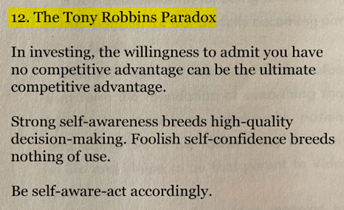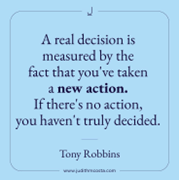
The Tony Robbins Paradox. I’ve got to refer to Conor Neill once again as he was inspired by Sahil Bloom’s tweet series about the most powerful paradoxes of life. Neill paraphrased the Tony Robbins Paradox clearly and directly as: “The Tony Robbin’s Paradox: In investing, the willingness to admit you have no competitive advantage can be the ultimate competitive advantage. Strong self-awareness breeds high-quality decision-making. Foolish self-confidence breeds nothing of use. Be self-aware-act accordingly.”
From my perspective and in an attempt to apply it to our “hospitality centric golf industry,” I believe the Tony Robbins Paradox offers valuable, if not profound, insights into effective decision-making, into time and team resource allocation strategies and more. The most significant principles I would like to highlight include:
- Self-Awareness and Competitive Advantage: Recognizing and owning the fact that you may lack (or clearly lack) a significant competitive advantage in a particular competency or characteristic, can be strategically advantageous. This awareness prevents overestimation of your abilities and strategies and the unwitting blindness to one’s (or the team’s) issues, weaknesses and/or threats. Instead, leaning into key emotional intelligence factors (or EQ2) like self-awareness, self-regulation, and organizational awareness is better and more advantageous nearly always. Crucially, understanding your knowledge and authority on a given issue or topic is limited and there is always room for learning and improvement displays the following:
- Humility, Confidence and Self-Awareness: As I’ve written in the past, “humbition” is a beautiful thing to behold. Unlike selfish ambition and arrogance, (which is often rooted in the desire to get ahead even though one doesn’t truly believe they’re ready to get ahead), humbition inspires confidence; it inspires others and guides them to do the same. Learn more about how this concept applies to your career here: Building Blocks of Your Career Series, Part 9: Humbition
- Willingness to “Be the Idiot”: Learn more about the power of asking questions from Simon Sinek | Be The Idiot
- Openness to Constructive Feedback: Looking to mentors, advisors and mentees for their input on a given context, to “check your temperature” on the situation or matter is wise and shows respect to them, earns you respect for your example.

- Quality Decision-Making: Awareness of your own limitations as a leader, and that of your inner circle of leadership, is the first step in building strong decision-making processes and outcomes based on thorough analysis rather than overconfidence or worse yet, wishful thinking. To go further, it would seem these key concepts also apply:
- Actively Listening to Understand & Gain from Different Perspectives: Including those from diverse levels within an organization, provides a broader view and highlights potential unintended consequences of decisions. I’ve never been a fan of having a designated “devil’s advocate” per se, but certainly involving others, especially those who can help shed light on possible unintended outcomes and consequences, is a great way to get to the right decision.
- Bring Along Others in the Process: Bringing others along in the decision-making process will do more than lead to better decisions; it could, perhaps more importantly, result in better “buy-in” for the decision and better short-term and long-term culture behind it. This applies especially in organizations, like golf clubs, where service and hospitality are done by a team vs. by an individual, where the team needs to be on the same page and consistently aligned well towards their customer or member-centric mission.
- In the picture with Tony Robbins’ quote, we can see that if a decision has not generated action as an outcome, we have likely cut corners or failed in the decision-making process and we “haven’t truly decided” anything.
- Understanding How Our Emotional Responses Influence Our Decisions: Fact, most poor decisions are made based on emotion, made under duress or stress and with little consideration for rational thoughts, facts or similar. Most poor (e.g. our most regrettable) decisions happen for each of us when we are:
- Mad or angry
- “Hangry” (Hungry + Angry)
- Sad, disappointed or feeling alone
- Tired
- In a rush (so urgent outweighs importance)
- Foolish Self-Confidence or Corporate Confidence: Blindly relying on past successes as an individual or team’s “winning formula” without assessing current dynamics can lead to poor decisions, bad outcomes, negative cultural trends and significant losses.
- Understanding that what worked before may not be applicable now is crucial. It’s akin to using the right tool for the job—recognizing when adjustments are necessary based on changing circumstances. (For example, a hammer is great for pounding in that nail, or removing another, but it’s not the right solution when dealing with a screw, a bolt or a staple.) For more on this, refer to the last article in this series: The Icarus Paradox
- Acting Accordingly: Once you understand your strengths and weaknesses, or those of your organization, one can tailor actions appropriately. Further, one can start to recognize opportunities and threats with a key to “flipping the threats into opportunities.” This includes:
- Seeking Advice from the Right Experts: yes, this one is obvious, but finding the right expert(s) may be the most crucial. They may be right next to you; they could be your biggest critic too.
- Diversifying Your Inputs: Seeking out a different perspective, including a negative one, is courageous and takes some guts (confidence), but these are often the most valuable and clarifying inputs we can receive.
- Diversifying or Moving our Resource Investments: Based on our authentic and open analysis process, our quality decision-making process, our next step is to do what we need to do to prioritize what needs to be done, what needs to me reallocated (moved) in terms of resources (money, time and/or people) to make the decision go from a choice to an action or outcome. This is imperative and it’s essential to follow through with the action on the decision in a corporate context, as it can ensure alignment across the team or organization to reinforce commitment and accountability.
In conclusion, the Tony Robbins Paradox underscores the importance of humility and self-awareness in decision-making, both personally and as a leader of any team or organization. By acknowledging our limitations and biases (aka blind spots), individuals and organizations can make more well-informed and effective choices. As a result, we are more likely to see “winning outcomes” or “win-win outcomes.” This mindset contrasts sharply with the common belief that unwavering confidence always leads to success, highlighting the importance of realistic self-assessment in achieving sustainable results.
In the next installment of this series, Paradox Series IX, we will dig into what some call the “The Taleb Surgeon Paradox”
This one will unpack our tendency to be “about the show” or “the book cover” and not the content and similar. I’m already looking forward to the ways that will drive me to think and consider. Thanks for taking the time to read this article. If you have a story to share, an issue you’re facing professionally or similar, please reach out to me when you can. If you are seeking any help with your career or similar, please click on the “Book an Appointment on Monte’s Calendar” link below.

Monte Koch, PGA Certified Professional, CIC
[email protected] | 206.335.5260
PGA of America | PGA Career Services | Career Coach & Consultant
Certified Interview Coach | Certified Predictive Index Practitioner
Based in South King County, WA